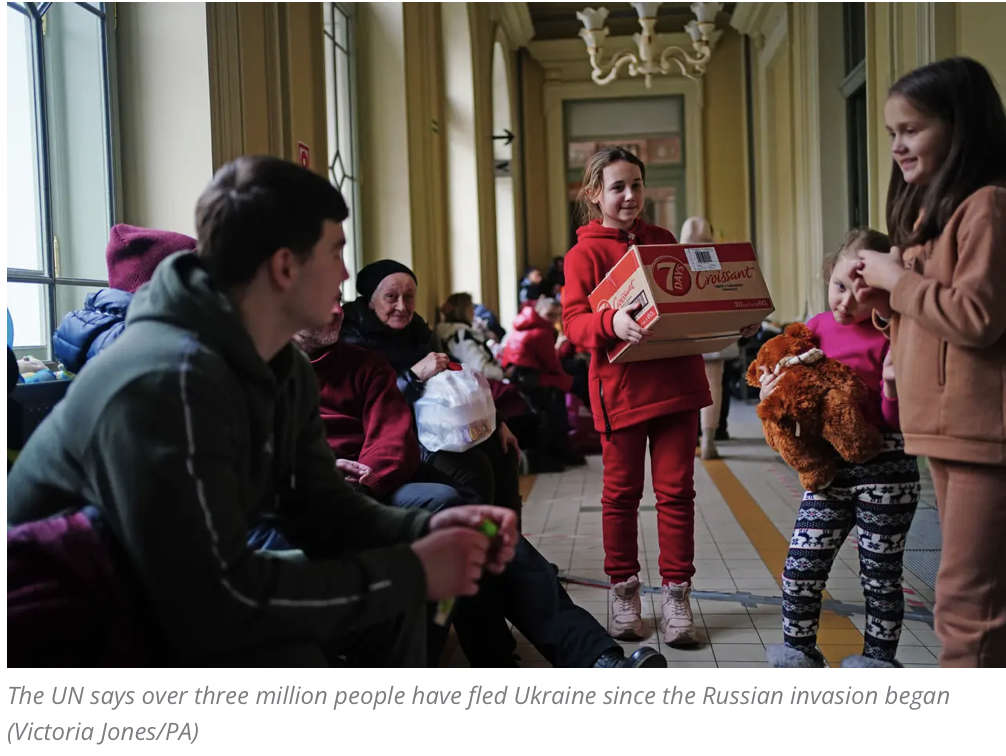
The Homes for Ukraine programme has launched, allowing people and organisations in the UK to offer Ukrainian refugees a place to stay.
Anyone with a room or home available can apply. The scheme is open to those fleeing the war in Ukraine – previously, only Ukrainians with family members already settled in the UK could come to the country.
Members of the public must provide accommodation for at least six months, and will need to submit to security checks, and possibly also safeguarding checks. Hosts shouldn’t charge any rent, but each household will receive an optional tax-free monthly payment of £350. They don’t need to provide meals or cover any other costs of living for guests, unless they wish to do so philanthropically.
The scheme launches on March 18, and over 150,000 people had already registered their interest in offering a home beforehand.

Clinical pyschologist Dr Marianne Trent from Good Thinking Psychological Services (goodthinkingpsychology.co.uk) shares her advice on what to think about if you’re opening up your home to a refugee.
Consider communication
“There’s obviously a cultural and language barrier,” says Trent. “Google Translate might be helpful here, or quickly trying to learn on Duolingo. There might be some cultural barriers, but you could also start thinking about drawing pictures with them, to try and bridge that communication gap.”
She adds:
“It might be useful to learn a bit about Ukrainian culture” – and, if you can, source products they might be familiar with from home. “People being repatriated have lost many of their constants – most of the things they are familiar and comfortable will have been left behind. So think about ways to help them connect to their own ways of soothing – we’ve all got unique ways of soothing ourselves – that might be food that we like, it might be rituals and routine.”
Encourage them to talk
“People who have experienced trauma – often they might think they want to keep it to themselves, and others won’t manage hearing about what they’re thinking about,” Trent explains. “But it can be really helpful to talk and stay open.”
She recommends asking questions such as: ‘Could you tell me something about you?’, ‘Tell me what things you like?’ or ‘What have you done for work?’ to get to know someone, and help them feel more comfortable opening up.
When someone has experienced trauma, “It can be really useful to write things down that you remember” – so Trent says: “You might find it’s useful to give the people staying with you paper, notebooks” so they can work through the things that might have happened to them. “It doesn’t matter if you can’t understand it, because the processing” is the point of the exercise, Trent suggests.

Take practical steps
Consider the environment of your house:
“Somebody who’s traumatised might find sudden noise and the unpredictable noise of a household a bit overwhelming,” says Trent, so you might want to think about “how you can try to make noise a little bit more balanced”.
She continues:
“It will depend on individual households and trust levels, but make sure they know where the doors are, they have control of the doors, they can come and go when they want to, (and) they know how they can access the internet if they want to be able to stay in contact with people who are still in Ukraine – so they feel like this is a home from home, and they’ve got control within that setting.
“Help them feel soothed – encourage them to take care of themselves and eat, sleep, drink and rest – and know people aren’t going to be barging into their room and causing chaos, but this is their space and they’re welcome to use it how they want to.”
Give them purpose
“Feeling like you’ve got a sense of purpose can be really useful, and having that choice,” advises Trent. She recommends saying something like: “I won’t mind at all if you want to help with the cooking”, or “If you want to get out there and do the garden, feel free.”
She explains: “Routine and structure can be really useful in helping people be functional… If they want to feel like they’ve got a role and a purpose and a function, then absolutely lean into that.”


Advice from someone who has hosted before
Pia McEwen, 59, originally comes from Finland, and currently lives in Dagenham, Essex, with her partner. She first welcomed an Afghan refugee into her home around 2017, and has since hosted three more people from Kuwait, Sudan and Albania.
“They were no trouble at all,” she says.
Her advice for anyone hosting a refugee is: “Allow people their time to think and be sad. If a person wants to stay in bed all day, let them.”
She continues: “Sometimes, hosting people is a way of making friends for life.”


 Five Fantasy Worlds We’d Love To Explore In Real Life
Five Fantasy Worlds We’d Love To Explore In Real Life
 Five Amazing Global Meals To Cure The January Blues
Five Amazing Global Meals To Cure The January Blues
 Five Incredible Spas Around the World
Five Incredible Spas Around the World
 Five Fab Wellbeing UK Destinations Ideal in January
Five Fab Wellbeing UK Destinations Ideal in January
 Five Weird Wellbeing Foods Around The World
Five Weird Wellbeing Foods Around The World